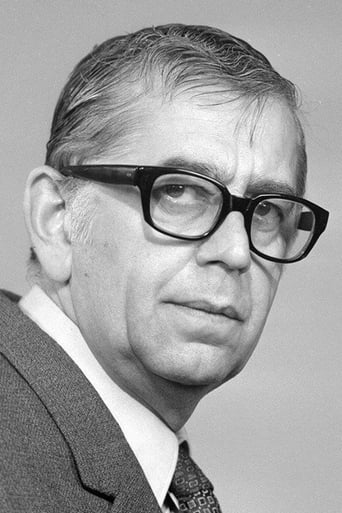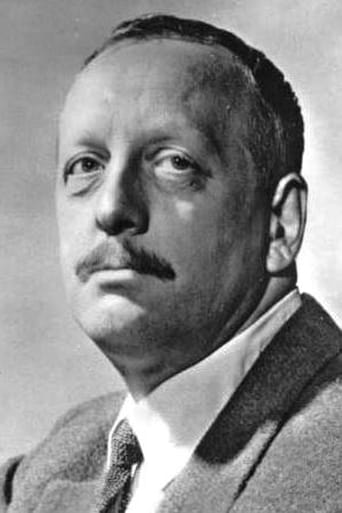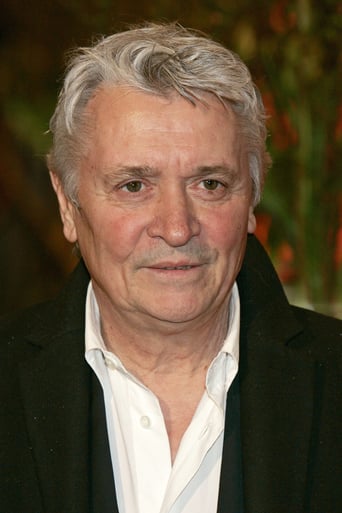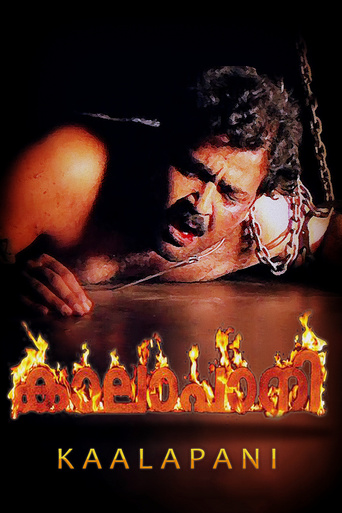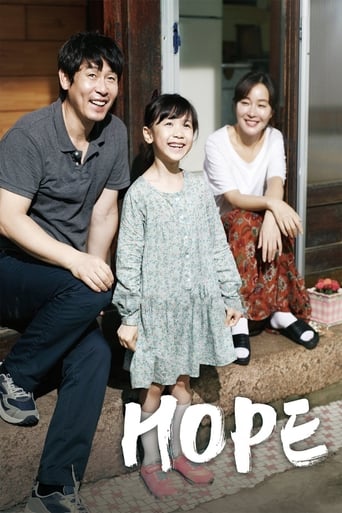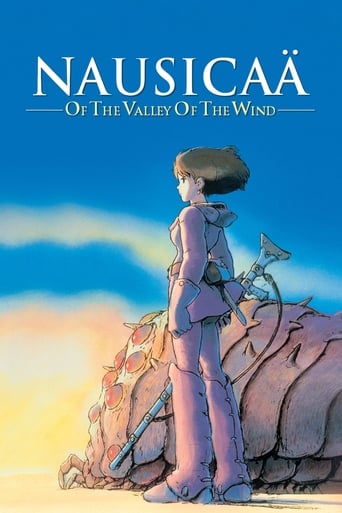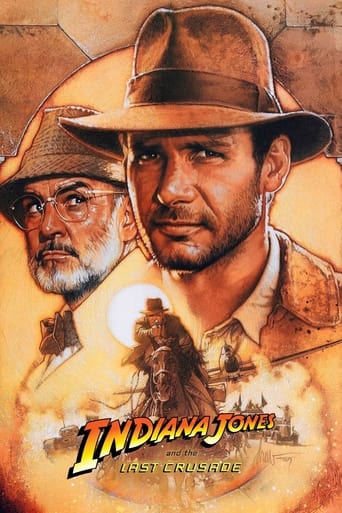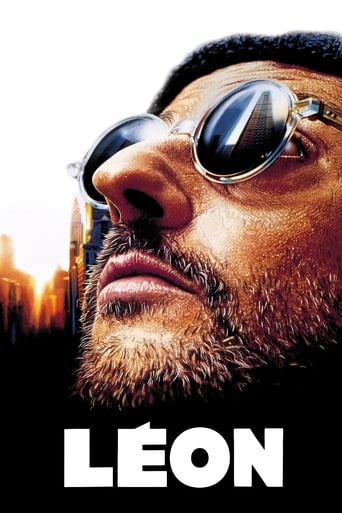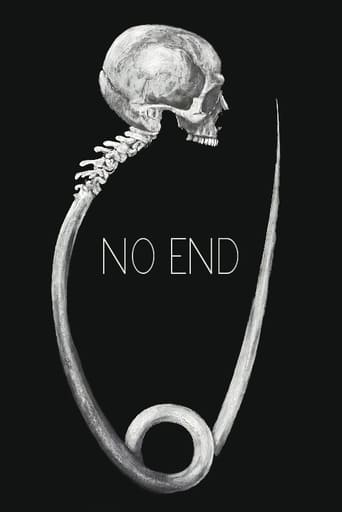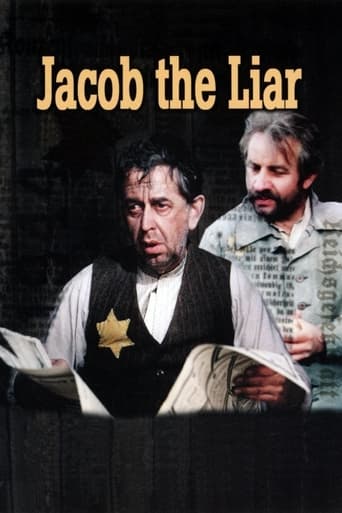
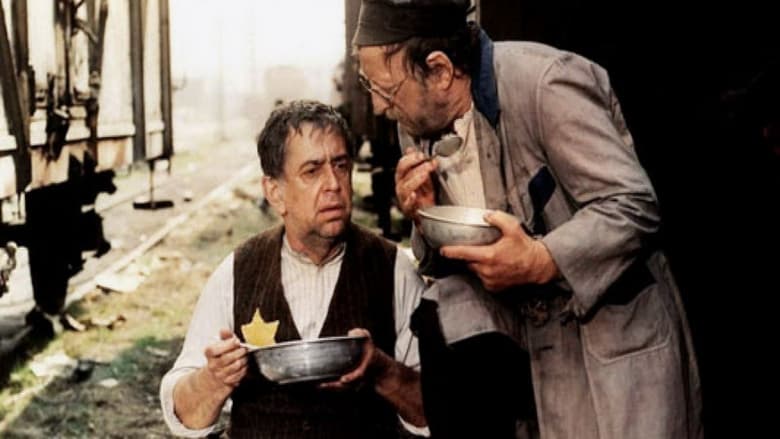
Jacob the Liar (1975)
A Jewish ghetto in the east of Europe, 1944. By coincidence, Jakob Heym eavesdrops on a German radio broadcast announcing the Soviet Army is making slow by steady progress towards central Europe. In order to keep his companion in misfortune, Mischa, from risking his life for a few potatoes, he tells him what he heard and announces that he is in possession of a radio - in the ghetto a crime punishable by death. It doesn't take long for word of Jakob's secret to spread - suddenly, there is new hope and something to live for - and so Jakob finds himself in the uncomforting position of having to come up with more and more stories.
Watch Trailer
Cast
Similar titles
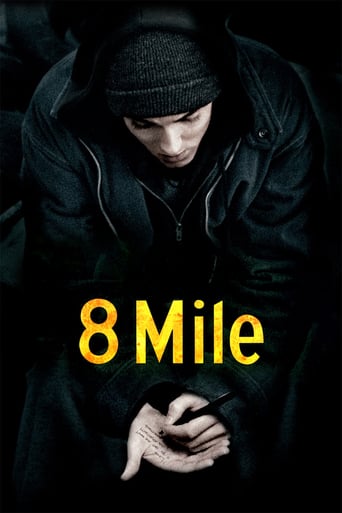
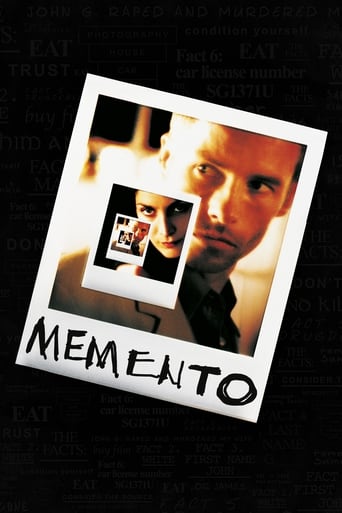
Reviews
Excellent but underrated film
Exactly the movie you think it is, but not the movie you want it to be.
It's a feast for the eyes. But what really makes this dramedy work is the acting.
It is encouraging that the film ends so strongly.Otherwise, it wouldn't have been a particularly memorable film
The movie starts with a violin and scenes of the Jewish ghetto. Jakob is one of many Jews in a German-controlled, Polish ghetto. While walking home one night he is sent by a guard to headquarters. There he hears a brief broadcast that Russian troops are doing well against the Germans. The next day, in a desperate attempt to save his friend from committing a rash act and stealing potatoes, he tells him of the Russian advance. He twists the story and it soon is believed that he possess a radio. In order to protect his exaggeration, he continues to tell more and more lies by pretending he hears them on the radio. His lies have a huge impact on camp, but he eventually needs to tell the truth to his friend Kowalski, who kills himself out of despair for living another day in the ghetto. The Jakob's lie remains largely undiscovered, his street is eventually deported to their presumed death.At the beginning of watching the movie I was quite sick of seeing another German movie about WW2. However this movie was amazing. I like how it toys with the perception of truth. Plenty of truths are told that are harmful, and lies are told that are good. Furthermore, truth is merely the acceptance of truth and is useful in so far as it accomplishes an act. Though Jakob may never had possessed a radio, his initial statements were disbelieved. The same way a cloud is out of water, though it is really out of tiny drops of frozen water. Though the obvious interpretation is that life in the ghetto was terrible, and that Jakob's lives were pure hearted, it's also a statement on underlying scientific notions that we cannot legitimately achieve through personal work what we can do together. That notion is very clear for an East German movie. I enjoyed the way the film cut to flashbacks to explain who characters were. It's a short, concise and brilliant method of exposition. The relationships were very well-developed. Rosa and Mischa's courtship was handled well. Although it's obviously sincere, no reasonable parent would approve of such a love in the ghetto. Though abuses are shown, such as when Herschel Schtamm is killed after investigating a boxcar. Much of the movie focuses on the psychological damage forced by isolation, poverty, and a general racism. The movie knows that abuses are known, it's the stories of relationships that aren't as things like letters and radio were banned. For example, Uncle Jakob's care for his niece, and the niece herself, show a compassion. The explanation of his lamp helps to put emphasis on the love of families that was destroyed, frankly by any organized government and especially that of the 3rd Reich.
The Holocaust has been told in many different ways. We have seen the brutality of it in documentaries on cable as well as in a number of contemporary films. The visuals of Aryan supremacy in Leni Reifenstahl's Nazi propaganda films, images of mountains of dead Jews and extremely inhumane conditions in death camps in Schindler's List, serve not merely to drive the film narrative but stir our emotions as well. These images have conditioned us to read such films and documentaries using stereotypes of both the Jews and the Nazi Jews are good and the Nazi, evil. The film Jakob the Liar explores the holocaust in a new light, presenting anti-Semitism in a relatively subtle way without compromising its substance as well as the film's power to move human emotion.The music is monotonous suggesting the monotony of the protagonists' lives in the ghetto. Shots are limited to medium shots and lots of close-ups making one feel claustrophobic, enveloped, and asphyxiated even. This immensely adds to an atmosphere of hopelessness and despair. Close-ups also give specific information about the character, their feelings, the way they live, the things they've gone thought and their relationships with each other. The personal information provided us makes us develop a sense of closeness with the characters. Midway in the film, we already have a bond with the characters, we already know their real feelings despite the lightness, surrealistic and oftentimes humorous treatment of the scenes. It is also quite extraordinary to depict the Nazi they way this film did considering that this is a holocaust film and one of the first East German film to tackle the subject. Unlike in other film where the Nazis are portrayed as unreasonably evil and sadistic, here we are given a glimpse of their humanity. In the introductory scene where a tower guard tells Jakob to report to Gestapo headquarters for not complying with the curfew, we saw instances where Jakob would have surely been severely punished or even killed but the officers were surprisingly reasonable and just. One officer caught him eavesdropping but lets him go, Jakob then wakes up a sleeping head officer to report his misdemeanor yet even with being irritated for being roused awake, he lets Jakob go without a scratch. The tower-guard, proved wrong, lets Jakob go as well. We also saw guards who are not necessarily the perfect Aryan depicted in Riefenstahl films. There was one guard who walks with a limp and another having the runs. There was also a scene where one guard beats up a Jew (Kowalski), then later returns and drops two sticks of cigarettes for Kowalski - an unspoken apology for having beaten up the Jew. A Nazi apologizing to a Jew in a holocaust film! Is that something or what? But then, the film doesn't make us hate the Nazi guards or to view them as the villains in the film. Instead we are made to understand the situation and the circumstance is the real enemy here. This is not a movie pitting the Jews against their Nazi guards like the director's own "Naked among Wolves"; this is a film about a people's struggle to maintain their dignity and humanity amidst the hardships they have suffered.The film started with glimpses of the ghetto and Jakob checking out his sick niece, all these visuals already gives us an idea of the life of the protagonist and the place he lives in. Then in a very short verbal exchange with one of the ghetto's denizen, Jakob gives us a background of his situation, that a guard took his watch from him. The guy he was talking to on the other hand warns him about the curfew to which he answers that without his watch, has no way to tell time. This sequence tells us that first, the guards can take and do take from the Jews anything they want and second, that the people are in constant fear of the guards and dare not disobey any rules lest one wants to be severely punished or killed. It also tells us that in the event that Jakob gets killed, he will be leaving his young and sick niece to care for herself. The character's actions and mood also imply of a prevailing state of constant fear - whether that of being killed or seeing someone close to you die a meaningless death.The Jews in the film were waiting for an inevitable annihilation, a fate they have long accepted until Jakob gave them an alternate view of the future because of his news of a possible liberation by the Russians.Through out the film, we are still constantly given pieces of Jewish life before the ghetto. Through flashbacks and what the characters say, we are presented concrete glimpses of how their lives of the films protagonists were before the ghetto. We also shown that in the ghetto, former actors, lawyers, businessmen and even people from the church lose their former identities. In the ghetto, they are made to wear the star and made to work and follow rules like everybody else, albeit their former position or affiliation. Everybody suffers, everyone is subjected to the harshness of ghetto life everyday there's no distinction in class, social status, age and/or sex. We see old people doing hard labor, children getting sick and eating mere crumbs or pieces of vegetables. We see the protagonists picking flies out of their soup and making a feast out of minced onion and a slice of bread. Frank Bayer told the story and made us feel what the characters felt using visuals and very powerful visuals at that.
This movie is a story full of lies that brought more hope to the Jews living in the Ghetto. Jakob was the one being outside after curfew and he had to report to the Police, and after walking into the station he heard some news on the Radio. He thought that it was good news that the Russians were coming closer. He could not m=keep that to himself so he went and told this to one of his friends who was not supposed to say anything. After a short while the whole Ghetto was talking about those news. Jakob saw that everybody was feeling much better so he continued to tell lies about the news. This is a movie that gets better and better as it moves along. It also gives hope to the Jewish people in the Ghetto and Jakob was having good intentions but it just complicated itself more and more.
This was the first and only East German film ever to be nominated for the Best Foreign Language film Oscar. It won many other awards, and features three actors, who are still very much active today. It has been re released in video throughout the world. I saw it after ordering it recently from Amazon.com. For all the accolades the film received, I must say that I enjoyed the recent American remake, directed by a Hungarian Holocaust Survivor, much more. I know the critics panned this version, but curiously the same things critics hated about the remake are taken right out of this, the original. In any case, the original is also good, though disappointing if you enjoyed the recent JACOB... The film does offer us the opportunity to see the famous Czech actor, V. Brodsky, still very active in Czech film and TV. We also see a young (late 30s) Armin Mueller-Stahl, prior to his defection from Communist East Germany. Interestingly, he also starred in the recent remake as the sixtyish doctor in the film. The young romantic (played by L. Schreiber in the remake) is played by the still active Henry Hubchen, recently featured in the German hit SONNENALLEE. In my opinion, the film is mostly worthwhile for these hindsight curiosity values. However, many will feel it is indeed a landmark film, on its own. Watch it and decide what you think.
